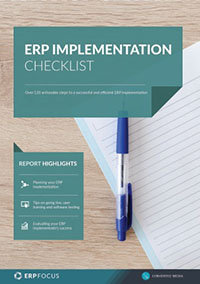ERP Master Data & Data Cleansing Failure
This ERP failure cause is a tricky one to assess during the course of a project for two reasons: first, it’s difficult to quantify how big the total work load is, and how much tangible progress has been made against that work load, and second, unless you are highly outside the normal distribution, you will be cleaning legacy data and entering ERP master data the night before go-live. So this is one of those categories which will never be done early enough or completely enough to make you sleep well. The relevant question to this article is when is ERP data cleansing and master data loading in such jeopardy that you should lose sleep because the ERP implementation is at intolerable risk? This is not a hard science – prudent judgment needs to be applied – but there are warning signals that should flag you to exercise that judgment.
ERP Master Data
The best indicator of ERP master data readiness is whether or not your integration tests achieve all of their stated objectives. If, during every test, there are unplanned gaps because of missing or incorrect master data, then chances are good the same will happen at go-live. If your final integration test – which should be an after-the-fact volume parallel of the real world – stumbles significantly because of master data, then ERP go-live will stumble as well. Do not proceed with a go-live without a high degree of confidence obtained from successful volume testing of ERP master data - If you do, ERP failure will be all the more likely.
ERP Data Cleansing
Testing also will tell you a lot about ERP data cleansing. If during testing, you are missing customers, or inventory, or purchase orders, you will likely track back the culprit to conflicting or erroneous data in legacy. Data cleansing normally boils down to a matter of trust, since most data cleansing problems must be fixed in the legacy systems, and for that you depend on the business users. When the night before go-live arrives, and the data has not been cleansed – and sometimes it won’t, because people just don’t get it – you have a tough decision to make, on whether to go ahead or pull the plug at the eleventh hour. Pulling the plug at the eleventh hour is obviously a highly visible thing to do, and you need to be prepared to answer the question “who didn’t do their job?”
Another warning signal is if ERP data cleansing/master data milestones are missed by an ever widening-margin throughout the life of the project plan. This says you are behind and falling farther behind over time.
This is the area that will embarrass you, the project manager, because generally speaking, you – and everyone else on the team – have delegated, communicated, followed-up, in general, done everything you were supposed to. When you find out that it didn’t get done as promised, it is still your fault, and is almost always too late to take effective corrective action. But if your data isn’t ready, postpone the implementation; with bad or incomplete ERP master data, ERP failure will ensue.
Free white paper

ERP Implementation: 9 steps to success
The 9 proven steps you should follow when implementing ERP

Featured white papers
-

ERP Implementation: 9 steps to success
The 9 proven steps you should follow when implementing ERP
Download -

ERP Implementation Checklist
Over 120 actionable steps to implementing a new ERP successfully
Download -

Manufacturing ERP Implementation Checklist
Over 70 actionable steps to rolling out new manufacturing ERP software
Download
Related articles
-

Change management for ERP implementation: a case study
A real-world example of the benefits of weaving change management into the fabric of an ERP imple...
-

CMMC Compliance: What Aerospace and Defense Manufacturers Need to Know
Key insights on CMMC compliance, deadlines, and securing DoD contracts with CMMC 2.0 certificatio...
-

A guide to the ERP life cycle
The stages of the ERP life cycle

